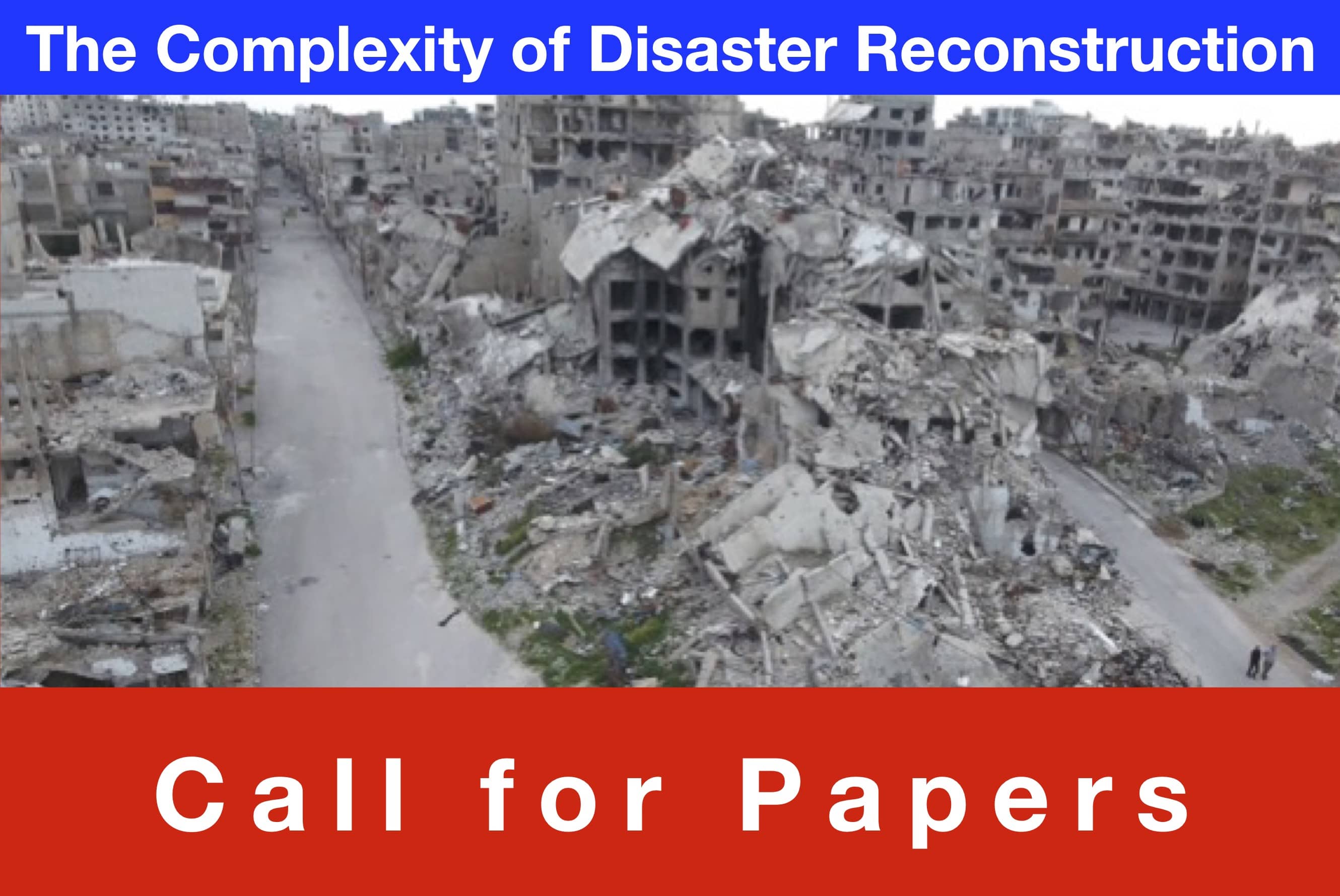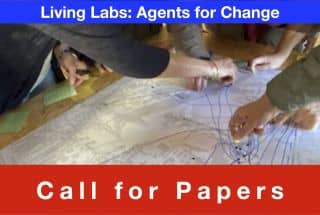
www.buildingsandcities.org/calls-for-papers/complexity-disaster-reconstruction.html
The Complexity of Disaster Reconstruction

Guest Editor: Paolo Tombesi (EPFL)
Abstract submission closed on 24 MARCH 2025 (noon GMT)
How can the complexity and challenges of physical territorial reconstruction (after disasters) across diverse disciplines, stakeholders and governance be organised and synthesised?
Do current debates and practices on physical territorial reconstruction (i.e. urban and rural built environments after destruction by "natural" disasters, warfare, conflict or industrial accidents) reflect the scope required to address the whole range of complex issues? Does the inherent complexity of the task cause the fragmentation of scholarship and knowledge into an array of disciplines and issues that must be partial in order to remain governable? Is there a need for a theory capable of composing and giving operational coherence and strength to separate efforts? Is there value in rethinking how knowledge can be managed?
Aims and scope
The aim of this special issue is to probe the socio-technical, conceptual and organisational processes underlying physical reconstruction after disasters. The focus is on the integration of diverse knowledge domains in planning processes concerned with the reconstruction of damaged or destroyed urban and rural territories. Whilst recognizing the wealth of analyses and experiences focusing on distinct aspects of physical reconstruction, this special issue will explore the ability of different conceptual dimensions to be brought to inform one another, within a systemic view of the entire endeavour. By emphasizing disciplinary and methodological differences between contiguous efforts that might be better functionally connected, the special issue seeks to expose the complexity of physical rebuilding and social recovery processes whilst highlighting areas, gaps or links in need of scholarly or specialist attention.
This special issue has five strategic objectives:
1. to elucidate the epistemological and
socio-technical complexity of reconstruction efforts
2. to explore the political
dimensions of dealing with the same problem at different scales
3. to address the practical challenges of
exploiting multi-disciplinarity within a landscape defined by advanced
specialisation and knowledge fragmentation
4. to reflect on the transferability of lessons typically
characterised by intrinsically idiosyncratic experiences
5. to discuss the role of theory in reconstruction
studies and practice, as well as its relationship with data collation.
Background
The term disaster is a term of common use in today's world, with hundreds of associable instances of major environmental damage or destruction recorded every year by dedicated international agencies. Disasters may arise from "natural" hazards i.e. floods, fires, volcanos, earthquakes, droughts, etc or result from human conflict or significant industrial accidents.
The orders of magnitude embedded in these figures explain the logical development and importance of pre- and post- disaster science, by now mature domains of investigation that produce millions of web links per year, fed by scores of data-collecting organisations, and the work of armies of researchers either geographically or discursively situated (when not both). Indeed, an archipelago of scholarly specialisms exist for disaster mitigation, management and resilience, each with
Reconstruction studies follow this general pattern of knowledge fragmentation and specialisation, giving rise to disciplines made out of a gamut of subfields, with their own vocabularies and agendas. These straddle from political economy to building heritage, material supply chains to project management methods, community participation to post-occupancy evaluation.
But how do scholars and policy makers make sense of this multifaceted knowledge base? Does the abundance of data and discussions it produces facilitate fields of knowledge integration and use, particularly across scales? Does it permit the pursuit of best disaster response practices 'overall'?
Suggested topics
Contributions on reconstruction are sought that address one or more of the above-mentioned strategic objectives and that provide analysis, synthesis or critical reflection. Explicit attempts at theory-building from empirical perspectives are welcome.
Given the desire for disciplinary synthesis, papers are sought on the practice of disaster reconstruction that draw attention to the variety of disciplinary bases and their relationship (or lack thereof), or speak of ways of procuring and organising knowledge, reaching and validating conclusions, evaluating the efficacy of procedures and tools, articulating lessons, assessing results, criticising methods, providing operative recommendations.
The following topics and questions provide possible entry points to such discussions:
Role of history in reconstruction studies
Is history a
proper field of analysis to identify and appreciate the interplay of
reconstruction elements?
How have
decisions made in the past about whether to rebuilt in the same existing
location or relocate elsewhere?
Definition of the 'heritage' in reconstruction
How does an
idea of heritage - a past either to recreate or to transcend - get constructed
or prevail over possible others?
Future resilience
What role does future recovery ability play in
reconstruction efforts and in the preservation of communities' identity?
Reconstruction and the
evolution of social structures
Is reconstruction inherently transformative at a social level, or does
it impinge on well-established social foundations?
Opportunism in
reconstruction
Can reconstruction be used as a pretext to introduce changes to the
affected environment that would have otherwise been impossible to carry out?
Priority actions
Does the success of reconstruction processes imply the respect of given
decisional sequences? Or should actions reflect tactical understanding of the
conditions on the ground?
Decision-making geographies
How does the location of decision-making power determine reconstruction
results?
How do multi-level governance influence the process?
How does the involvement of other organisations (NGOs) and
multi-stakeholder groups determine priorities?
Understandings from case studies
Is there a privileged information structure for overall reconstruction
narratives that seek to build comparable data sets of prior efforts? A
structure, in other words, which captures the essential whilst isolating the
peculiar?
Constants of reconstruction
Are successful reconstruction processes subject to sets of established constraints,
or do they require/allow adaptation to contingent factors?
Determinants of specificity
If the context
of reconstruction is paramount, what are the aspects that determine the
specificity of decisions against the transfer of knowledge from outside?
Bounded rationality
As resources are typically finite - is there a way to assess the efficiency
of their use against the efficacy of the results? In other words, is conditional
evaluation a necessity in reconstruction scholarship? And is it practiced?
Effects of uncertainty
To what extent and in which ways does the insecurity of the context
affect post-destruction intervention landscapes? Is security (or confidence in
the future) a precondition for effective reconstruction planning?
Methods of comparative
analysis
If individual cases of reconstruction processes are complex and situated,
how can their results be compared?
Conceptual categories in reconstruction
With
territorial damage or destruction being the possible consequence of multiple
causes, to what extent do associated reconstruction endeavours differ conceptually
depending on circumstances?
Trans-scalar challenges
Reconstruction implies interventions at multiple levels, often requiring
different socio-technical alliances, processes and timeframes. What are the
obstacles generated by the structural presence of multiple operational
landscapes? And how can they be overcome?
Timescales
How do short-, medium- and
long-term priorities and responses become agreed and coordinated?
Reconstruction and
computation
Can the application of big data analysis to post-disaster action records
help define successful patterns of behaviour in reconstruction policies? Can
computational technology reveal useful strategies by scrutinising existing data
in bulk? And can these data be made available?
Role of mitigation policies
in reconstruction
Disaster science dedicates much space to future mitigation measures.
Should these measures be considered as gauges for rebuilding or are they rendered
obsolete by the occurrence of the very events they are trying to minimise?
Planning autarchy
Under what conditions can reconstruction efforts and strategies be based
on the productive capacity of the affected area? Should recovery processes
privilege local capacity building or actual rebuilding?
Knowledge and technology
barriers
Does technical communication occur efficiently across reconstruction processes and the multiple tasks or areas of expertise involved, or are there barriers in transferring knowledge? If so, what are these barriers the product of?
Timeline
| Deadline for abstract submission | 24 March 2025 - noon (GMT) | |
| Full papers due | 05 September 2025 | NB: authors can submit sooner if they wish |
| Referees' & editors' comments to authors | 16 January 2026 | |
| Final version of papers | 06 March 2026 | |
| Publication of special issue | June 2026 | NB: papers are published as soon as they are accepted |
Briefing note for contributors
We welcome contributions from the research community in both the Global North and Global South.
You are invited to submit an abstract for this special issue. Please send a 500 word (maximum) abstract to editor Richard Lorch by 24 March 2025 (noon GMT). Your submission must include these 3 items:
- the author's and all co-author's names, institutional & departmental affiliations and contact details, email addresses
- the question(s) or topic(s) in this Call for Papers that the abstract and intended paper address
- the abstract (500 words maximum) defining the research question(s), scope, methods and results
Abstracts will be reviewed by the editors to ensure a varied, yet integrated selection of papers around the topic. Authors of accepted abstracts will be invited to submit a full paper (6000-7500 words), which undergoes a double-blind review process.
Buildings & Cities is an international, open access, double-blind peer-reviewed research journal. Its focus is the interactions between buildings, neighbourhoods and cities by understanding their supporting social, economic and environmental systems. More information can be found online: www.buildingsandcities.org & published papers are found here: https://journal-buildingscities.org
General guidance for authors can be found at https://www.buildingsandcities.org/pdf/Information-for-Authors.pdf
Open access and Article Processing Charge
Buildings & Cities is an open access journal and has an article processing charge (APC) of £1360 plus VAT. If you do not have institutional support, please contact the editor when submitting your abstract. We endeavour to assist those without funding.
Questions?
The Editors are happy to discuss ideas with potential authors. Please contact: Richard Lorch and Paolo Tombesi
Latest Peer-Reviewed Journal Content
Urban verticalisation: typologies of high-rise development in Santiago
D Moreno-Alba, C Marmolejo-Duarte, M Vicuña del Río & C Aguirre-Núñez
A public theatre as a living lab to create resilience
A Apostu & M Drăghici
Reconstruction in post-war Rome: transnational flows and national identity
J Jiang
Reframing disaster recovery through spatial justice: an integrated framework
M A Gasseloğlu & J E Gonçalves
Tracking energy signatures of British homes from 2020 to 2025
C Hanmer, J Few, F Hollick, S Elam & T Oreszczyn
Spatial (in)justice shaping the home as a space of work
D Milián Bernal, J Laitinen, H Shevchenko, O Ivanova, S Pelsmakers & E Nisonen
Working at home: tactics to reappropriate the home
D Milián Bernal, S Pelsmakers, E Nisonen & J Vanhatalo
Living labs and building testing labs: enabling climate change adaptation
J Hugo & M Farhadian
Energy sufficiency, space temperature and public policy
J Morley
Living labs: a systematic review of success parameters and outcomes
J M Müller
Towards a universal framework for heat pump monitoring at scale
J Crawley, L Domoney, A O’Donovan, J Wingfield, C Dinu, O Kinnane, P O’Sullivan
Living knowledge labs: creating community and inclusive nature-based solutions
J L Fernández-Pacheco Sáez, I Rasskin-Gutman, N Martín-Bermúdez, A Pérez-Del-Campo
A living lab approach to co-designing climate adaptation strategies
M K Barati & S Bankaru-Swamy
Mediation roles and ecologies within resilience-focused urban living labs
N Antaki, D Petrescu, M Schalk, E Brandao, D Calciu & V Marin
Negotiating expertise in Nepal’s post-earthquake disaster reconstruction
K Rankin, M Suji, B Pandey, J Baniya, D V Hirslund, B Limbu, N Rawal & S Shneiderman
Designing for pro-environmental behaviour change: the aspiration–reality gap
J Simpson & J Uttley
Lifetimes of demolished buildings in US and European cities
J Berglund-Brown, I Dobie, J Hewitt, C De Wolf & J Ochsendorf
Expanding the framework of urban living labs using grassroots methods
T Ahmed, I Delsante & L Migliavacca
Youth engagement in urban living labs: tools, methods and pedagogies
N Charalambous, C Panayi, C Mady, T Augustinčić & D Berc
Co-creating urban transformation: a stakeholder analysis for Germany’s heat transition
P Heger, C Bieber, M Hendawy & A Shooshtari
Placemaking living lab: creating resilient social and spatial infrastructures
M Dodd, N Madabhushi & R Lees
Church pipe organs: historical tuning records as indoor environmental evidence
B Bingley, A Knight & Y Xing
A framework for 1.5°C-aligned GHG budgets in architecture
G Betti, I Spaar, D Bachmann, A Jerosch-Herold, E Kühner, R Yang, K Avhad & S Sinning
Net zero retrofit of the building stock [editorial]
D Godoy-Shimizu & P Steadman
Co-learning in living labs: nurturing civic agency and resilience
A Belfield
The importance of multi-roles and code-switching in living labs
H Noller & A Tarik
Researchers’ shifting roles in living labs for knowledge co-production
C-C Dobre & G Faldi
Increasing civic resilience in urban living labs: city authorities’ roles
E Alatalo, M Laine & M Kyrönviita
Co-curation as civic practice in community engagement
Z Li, M Sunikka-Blank, R Purohit & F Samuel
Preserving buildings: emission reductions from circular economy strategies in Austria
N Alaux, V Kulmer, J Vogel & A Passer
Urban living labs: relationality between institutions and local circularity
P Palo, M Adelfio, J Lundin & E Brandão
Living labs: epistemic modelling, temporariness and land value
J Clossick, T Khonsari & U Steven
Co-creating interventions to prevent mosquito-borne disease transmission in hospitals
O Sloan Wood, E Lupenza, D M Agnello, J B Knudsen, M Msellem, K L Schiøler & F Saleh
Circularity at the neighbourhood scale: co-creative living lab lessons
J Honsa, A Versele, T Van de Kerckhove & C Piccardo
Positive energy districts and energy communities: how living labs create value
E Malakhatka, O Shafqat, A Sandoff & L Thuvander
Built environment governance and professionalism: the end of laissez-faire (again)
S Foxell
Co-creating justice in housing energy transitions through energy living labs
D Ricci, C Leiwakabessy, S van Wieringen, P de Koning & T Konstantinou
HVAC characterisation of existing Canadian buildings for decarbonisation retrofit identification
J Adebisi & J J McArthur
Simulation and the building performance gap [editorial]
M Donn
Developing criteria for effective building-sector commitments in nationally determined contributions
P Graham, K McFarlane & M Taheri
Join Our Community

The most important part of any journal is our people – readers, authors, reviewers, editorial board members and editors. You are cordially invited to join our community by joining our mailing list. We send out occasional emails about the journal – calls for papers, special issues, events and more.
We will not share your email with third parties. Read more



Latest Commentaries
COP30 Report
Matti Kuittinen (Aalto University) reflects on his experience of attending the 2025 UN Conference of the Parties in Belém, Brazil. The roadmaps and commitments failed to deliver the objectives of the 2025 Paris Agreement. However, 2 countries - Japan and Senegal - announced they are creating roadmaps to decarbonise their buildings. An international group of government ministers put housing on the agenda - specifying the need for reduced carbon and energy use along with affordability, quality and climate resilience.
Building-Related Research: New Context, New Challenges
Raymond J. Cole (University of British Columbia) reflects on the key challenges raised in the 34 commissioned essays for Buildings & Cities 5th anniversary. Not only are key research issues identified, but the consequences of changing contexts for conducting research and tailoring its influence on society are highlighted as key areas of action.